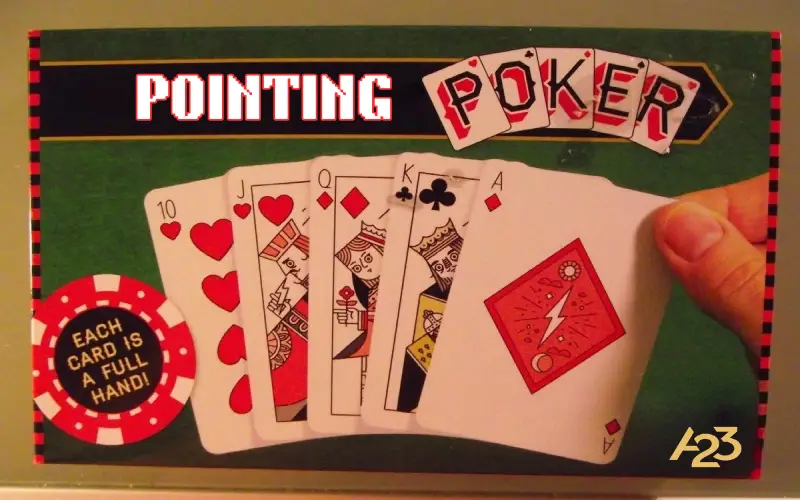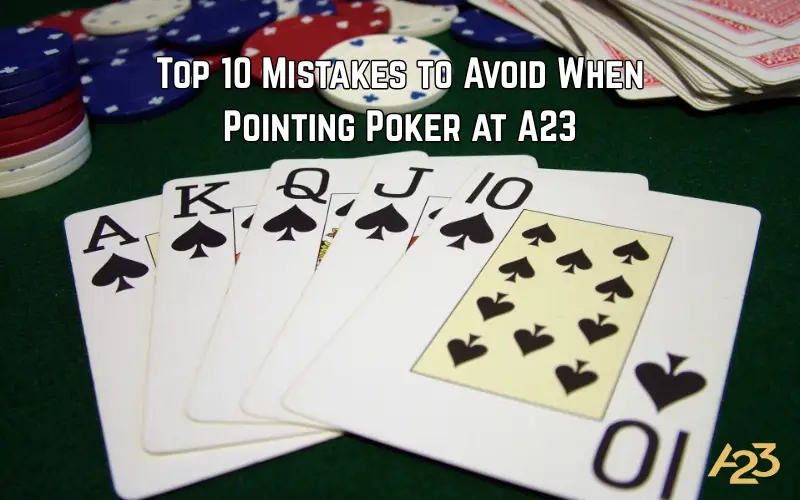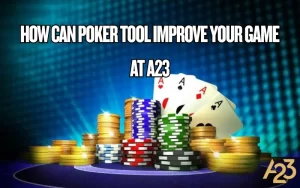Pointing Poker is a game of skill, strategy, and psychology. Whether you are a seasoned player or a newcomer, understanding the nuances of the game is crucial for success. A23 is a popular online platform that offers a thrilling poker experience, but even the best players can make mistakes that hinder their performance. In this article, we will explore the top 10 mistakes to avoid when playing poker at A23, helping you enhance your game and increase your chances of winning.
1. Ignoring Bankroll Management
One of the most common mistakes players make is neglecting proper bankroll management. It’s essential to set a budget for your poker sessions and stick to it. Here are some tips for effective bankroll management:
- Set Limits: Determine how much money you are willing to spend on poker and avoid exceeding that amount.
- Choose the Right Stakes: Play at stakes that are appropriate for your bankroll. A general rule of thumb is to have at least 20-30 buy-ins for the level you are playing.
- Track Your Progress: Keep a record of your wins and losses to understand your performance over time.
2. Playing Too Many Hands
New players often make the mistake of playing too many hands, believing that more action will lead to more wins. However, this approach can be detrimental to your overall strategy. To avoid this mistake:
- Be Selective: Focus on playing strong starting hands and avoid marginal hands that can lead to difficult situations.
- Understand Position: Your position at the table significantly impacts your hand selection. Play tighter in early positions and loosen up in later positions.
3. Failing to Read Opponents
Poker is not just about the cards you hold; it’s also about understanding your opponents. Failing to read your opponents can lead to missed opportunities and costly mistakes. Here’s how to improve your reading skills:
- Observe Betting Patterns: Pay attention to how your opponents bet in different situations. This can provide valuable insights into their hand strength.
- Look for Tells: Watch for physical or behavioral cues that may indicate the strength of your opponent’s hand. This can include changes in posture, facial expressions, or betting tendencies.
4. Overvaluing Hands
Another common mistake is overvaluing hands, particularly in situations where the board texture suggests potential draws. Players may become too attached to their hands and fail to recognize when they are beat. To avoid this mistake:
- Assess the Board: Consider the community cards and how they interact with your hand. Be cautious if the board presents potential straights or flushes.
- Know When to Fold: Don’t be afraid to fold strong hands if the situation warrants it. Sometimes, the best decision is to cut your losses and wait for a better opportunity.
5. Neglecting Position
Position is a critical aspect of poker strategy that many players overlook. Your position at the table can significantly influence your decision-making process. To leverage your position effectively:
- Play More Aggressively in Late Position: When you are in a late position, you have the advantage of seeing how your opponents act before making your decision. Use this to your advantage by playing a wider range of hands.
- Be Cautious in Early Position: In early positions, it’s advisable to play tighter and only enter the pot with strong hands.
6. Failing to Adjust Your Strategy
Every poker game is different, and failing to adjust your strategy based on the dynamics of the table can lead to poor results. Here are some tips for adapting your strategy:
- Observe Opponent Tendencies: Pay attention to how your opponents are playing and adjust your strategy accordingly. If they are playing aggressively, consider tightening up your game.
- Change Gears: Be willing to switch between aggressive and passive play styles based on the flow of the game. This unpredictability can keep your opponents off balance.
7. Chasing Losses
One of the most detrimental mistakes players can make is chasing losses. After experiencing a bad beat or a series of losses, players may feel compelled to increase their bets in an attempt to recover their losses. To avoid this pitfall:
- Stick to Your Strategy: Maintain your original strategy and avoid making impulsive decisions based on emotions.
- Take Breaks: If you find yourself on a losing streak, consider taking a break to clear your mind and regain your focus.
8. Not Utilizing Position Betting
Position betting is a powerful tool in poker that allows players to leverage their position at the table to their advantage. Failing to utilize position betting can limit your potential for success. Here’s how to make the most of position betting:

- Open Up Your Range: In late position, consider opening up your range and playing more hands. This can put pressure on your opponents and increase your chances of winning pots.
- Control the Pot Size: Use your position to control the size of the pot. If you have a strong hand, you can build the pot, while if you have a weaker hand, you can keep the pot smaller.
9. Ignoring the Importance of Table Selection
Table selection is a crucial aspect of poker that many players overlook. Choosing the right table can significantly impact your overall success. Here are some tips for effective table selection:
- Look for Weak Players: Seek out tables with players who are less experienced or exhibit poor playing styles. This can increase your chances of winning.
- Consider the Table Dynamics: Pay attention to the overall dynamics of the table. If the table is overly aggressive, it may be wise to find a more passive table where you can exploit mistakes.
10. Not Practicing Enough
Finally, one of the biggest mistakes players make is not practicing enough. Poker is a skill-based game that requires continuous learning and improvement. To enhance your skills:
- Play Regularly: The more you play, the better you will become. Make it a habit to play poker regularly, whether online at A23 or in live games.
- Study the Game: Invest time in studying poker strategy, reading books, and watching instructional videos. Understanding advanced concepts can give you a competitive edge.
Conclusion
Playing poker at A23 can be an exhilarating experience, but avoiding common mistakes is essential for success. By understanding the top 10 mistakes outlined in this article, you can enhance your gameplay, improve your decision-making, and increase your chances of winning. Remember to practice good bankroll management, read your opponents, and adapt your strategy based on the dynamics of the game. With dedication and a commitment to continuous improvement, you can elevate your poker skills and enjoy a rewarding experience at A23. So, gather your chips, take a seat at the virtual table, and put these tips into practice for a successful poker journey!








